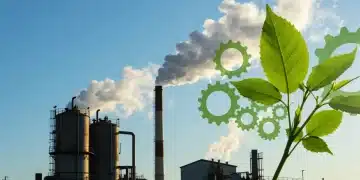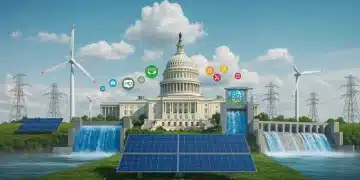Now energy policy discussion: what’s at stake for the future?

Energy policy implementation faces challenges like political resistance, funding issues, technological barriers, and a lack of public engagement, which hinder the transition to sustainable energy solutions.
Now energy policy discussion is more relevant than ever as we face critical climate and sustainability challenges. How do these policies shape our future? Let’s explore the pressing issues that affect us all.
Understanding the current energy policies
Understanding the current energy policies is essential as they shape our environmental and economic future. These policies determine how energy is produced, consumed, and regulated.
Key Aspects of Energy Policies
Energy policies play a critical role in promoting sustainability and reducing greenhouse gas emissions. They also influence the transition to renewable energy sources. The major aspects include:
- The balance between renewable and fossil fuel resources.
- Government incentives for clean energy investments.
- Regulations on energy efficiency standards.
- Support for innovation in energy technologies.
Different regions may have unique energy policies based on their specific needs. For instance, urban areas may prioritize reducing air pollution, while rural areas might focus on boosting local energy production. Understanding these differences is crucial for recognizing how policies impact communities.
Moreover, public awareness and participation can significantly affect policy changes. When communities advocate for stronger energy policies, they can influence government priorities. Grassroots movements have successfully promoted initiatives that favor renewable energy development.
Challenges in Current Energy Policies
Several challenges exist in implementing effective energy policies. One major issue is balancing economic growth while achieving environmental goals. Policymakers often grapple with prioritizing sustainable practices over short-term gains. Additionally, the resistance from stakeholders invested in fossil fuel industries complicates the landscape.
It’s also important to consider the global context. International agreements like the Paris Agreement aim to unify countries in their efforts to combat climate change. Understanding how these agreements influence local energy policies helps us see the broader picture.
The impact of energy policies on sustainability
The impact of energy policies on sustainability is profound and multifaceted. These policies dictate how we produce and consume energy, shaping our environment and future.
Renewable Energy Initiatives
One of the primary goals of energy policies is to promote renewable energy. Countries around the world are implementing policies that support the development of wind, solar, and hydroelectric power. By shifting focus to renewable sources, we can significantly reduce our carbon footprint.
- Investment in infrastructure for renewable energy.
- Incentives for homeowners to install solar panels.
- Tax breaks for companies developing green technologies.
Furthermore, these initiatives not only help the environment but also create jobs and drive economic growth. Regions that adopt strong renewable energy policies often see improved local economies.
Energy Efficiency Standards
In addition to promoting renewable energy, policies often include measures for improving energy efficiency. New energy standards require appliances and vehicles to use less energy, resulting in cost savings for consumers and decreased environmental impact.
For example, improving the efficiency of buildings can reduce heating and cooling costs. Smart technology also plays a role in optimizing energy use within homes and businesses. This integration of technology not only makes energy consumption more efficient but also informs consumers about their usage patterns.
Energy policies that focus on sustainability encourage the responsible use of resources. They push society towards a future where energy needs are met without compromising the planet’s health. The transition to sustainable energy sources, backed by effective policy, has the potential to heal our environment and provide a better quality of life for future generations.
Key stakeholders in energy policy discussions

Key stakeholders in energy policy discussions are crucial in shaping the future of energy. Each stakeholder plays a unique role in the conversation around energy production, regulation, and sustainability.
Government Agencies
Government agencies are among the primary stakeholders. They create and enforce laws regarding energy usage and sustainability. Their involvement can help ensure that energy policies align with the public interest. Agencies often set standards for emissions and energy efficiency, driving states and businesses toward cleaner energy solutions.
- Department of Energy (DOE).
- Environmental Protection Agency (EPA).
- State energy offices.
These organizations collaborate with other sectors to implement policies that reduce carbon footprints and promote renewable resources.
Private Sector Leaders
Companies in the energy sector are also critical players. Energy providers, technology developers, and large corporations contribute to policy discussions. They often seek to influence regulations, aiming for favorable conditions for business growth.
For instance, energy companies advocate for incentives that support renewable energy investment. As the world shifts towards sustainability, private sector leaders are increasingly prioritizing green solutions and innovations.
Civil Society and Advocacy Groups
Civil society organizations and advocacy groups play a significant role in energy policy discussions as well. These groups represent public interests and advocate for environmental justice. They work to educate the public on energy issues and often lobby for policies that protect both the environment and community interests.
By raising awareness about the impact of energy production, these stakeholders push for accountability among government bodies and corporations. They are vital in ensuring that diverse voices are heard throughout the policy-making process.
Academic and Research Institutions
Academic institutions and research organizations contribute valuable evidence and analysis to energy discussions. Their research helps to inform policy decisions based on data and scientific findings. They often provide expertise on new technologies, making them essential in shaping future energy solutions.
By collaborating with other stakeholders, these institutions help to bridge the gap between theoretical knowledge and practical application in energy policy.
Emerging trends in global energy policy
Emerging trends in global energy policy reflect the evolving landscape of energy production and consumption. As nations face climate challenges, they are increasingly adopting innovative policies to ensure a sustainable future.
Increased Focus on Renewable Energy
One of the most significant trends is the push towards renewable energy sources. Countries are setting ambitious targets for renewable energy adoption. Governments are investing in technologies like solar, wind, and hydroelectric power.
- Incentives for businesses to develop renewable projects.
- Subsidies for homeowners to install solar panels.
- Goals for achieving net-zero emissions by certain deadlines.
As a result, nations worldwide are transitioning away from fossil fuels, reflecting a commitment to sustainability.
Energy Efficiency Improvements
Another trend is the focus on energy efficiency. Governments are implementing stricter regulations that promote efficient energy use across various sectors. This can reduce overall energy demand and lower costs for consumers.
For example, stricter fuel economy standards for vehicles and energy ratings for appliances encourage consumers to choose more efficient options. These efforts not only save money but also decrease greenhouse gas emissions.
Many countries are also investing in smart grid technologies, allowing for better energy distribution and reduced waste. Such innovations enhance the management of energy resources.
Decentralization of Energy Production
Decentralization is another emerging trend in energy policy. Instead of relying solely on large, centralized power plants, countries are encouraging local energy production. This means more homes and businesses generate their own energy through solar panels or small wind turbines.
This shift promotes energy independence and resilience, particularly in the face of natural disasters or supply disruptions. Local energy production empowers communities and reduces reliance on traditional energy sources.
International Collaborations
Finally, international collaboration is becoming increasingly important in global energy policy. Countries are recognizing that energy challenges are global and require joint efforts. Shared technologies and resources can help address climate change more effectively.
Global agreements, such as the Paris Agreement, encourage nations to work together on emission reductions. These partnerships foster innovation and the sharing of best practices, accelerating progress towards sustainable energy solutions.
Challenges facing energy policy implementation
Challenges facing energy policy implementation are significant and complex. As countries strive to adopt sustainable energy solutions, several obstacles can hinder progress and effectiveness.
Political Resistance
One major challenge is political resistance. Energy policies often face opposition from various political factions. Some groups may prioritize economic growth over environmental concerns. This can lead to conflicts over regulations and investments in renewable energy.
- Lobbying by fossil fuel industries.
- Political instability affecting policy continuity.
- Conflicts between state and federal regulations.
Such resistance can slow down the development and adoption of crucial energy policies designed to mitigate climate change.
Funding and Investment
Another significant challenge is securing funding for energy initiatives. Many renewable energy projects require substantial initial investments. Without proper funding, even the best policies can fail.
Government budgets may be limited, and private investors might hesitate to commit resources to new technologies. Thus, securing adequate funding is vital for advancing energy policy goals.
Technological Barriers
Technological barriers also impact the implementation of energy policies. While advancements in renewable technologies are promising, there are still challenges related to efficiency and storage. For example, solar and wind energy depend heavily on weather conditions, which can lead to unreliable energy supply.
Developing effective battery storage solutions and improving energy transmission infrastructure are essential to overcome these issues and ensure consistent energy delivery.
Public Awareness and Engagement
Public awareness and engagement are crucial for successful energy policy implementation. Many people do not understand the importance of transitioning to renewable energy. This lack of awareness can result in pushback against policies designed to promote sustainable practices.
Effective education campaigns are necessary to inform the public about the benefits of renewable energy. Engaging communities in discussions about energy policies can also foster support and encourage collective action.
FAQ – Frequently Asked Questions about Energy Policy Challenges
What are the main challenges in implementing energy policies?
The main challenges include political resistance, funding issues, technological barriers, and public engagement.
How does political resistance affect energy policy?
Political resistance can slow down the development of energy policies as various groups may oppose measures aimed at promoting sustainability.
Why is funding crucial for renewable energy projects?
Funding is vital because renewable energy projects often require substantial initial investments, and without it, these initiatives may not progress.
How can public engagement improve energy policy outcomes?
By increasing public awareness and involving communities, stronger support for energy policies can be generated, leading to more effective implementation.





